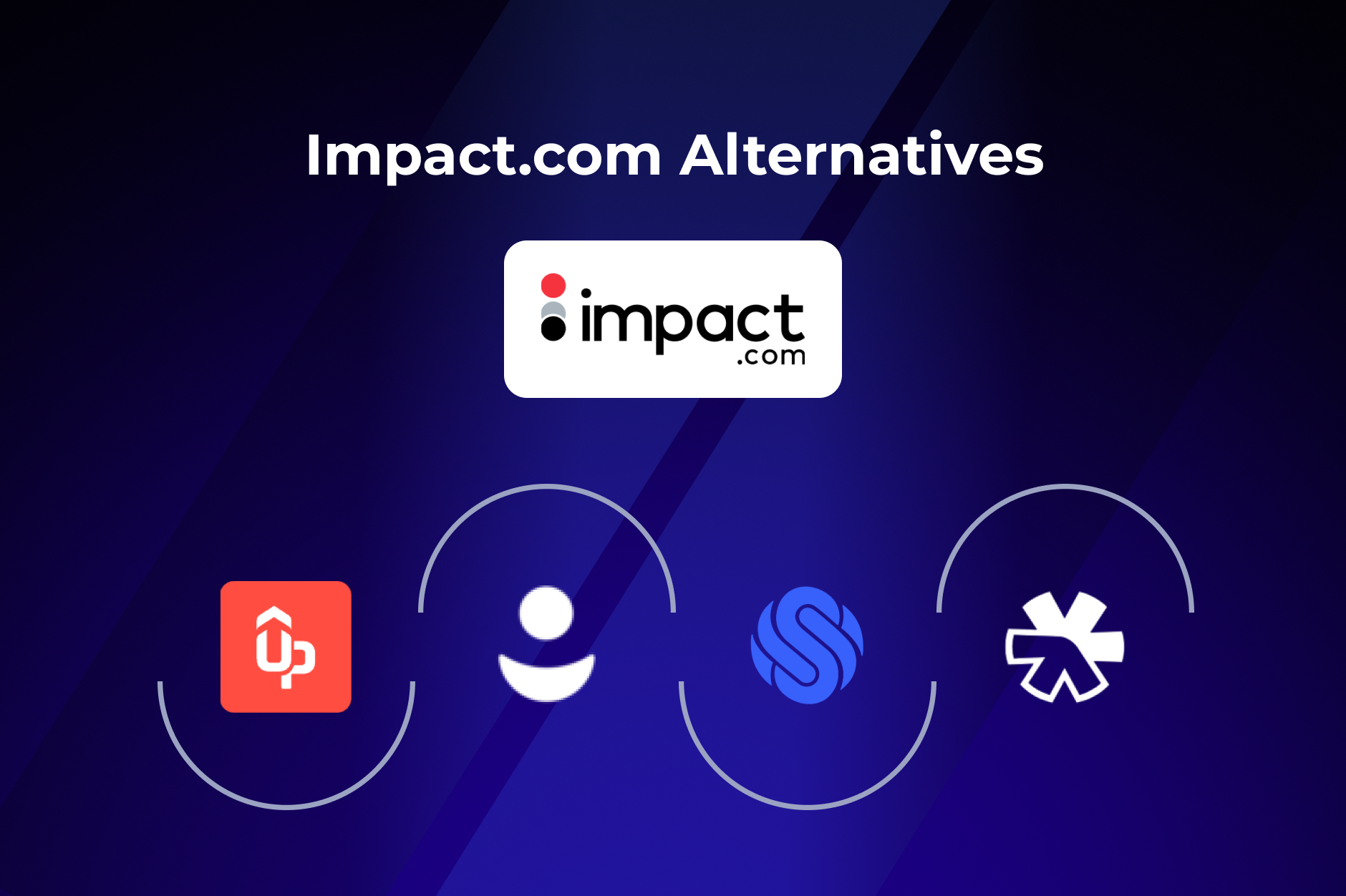Impact.com is one of the most recognized affiliate platforms in ecommerce. It’s powerful, built for scale, and trusted by large DTC brands. But that doesn’t mean it’s the right fit for every ecommerce brand.
If you have specific goals, like launching creator campaigns quickly, keeping overhead low, or managing everything from one dashboard, you might need something leaner, faster, or more integrated.
In this guide, we’ll break down the best Impact.com alternatives based on the goals that matter most to DTC brands, whether that’s automation, integration with TikTok Shop, cost-efficiency, or ease of use.
Impact Affiliate review: An enterprise-level affiliate marketing platform
Impact.com is a robust affiliate marketing solution used by large DTC brands and enterprise companies. It helps brands recruit, manage, and pay affiliates, influencers, and content partners at scale. The platform has features like tiered commissions, custom partner portals, detailed reporting, and multi-currency payments.
Ideal for: Large ecommerce brands that want deep customization, advanced tracking, and access to a large network of publishers and creators.
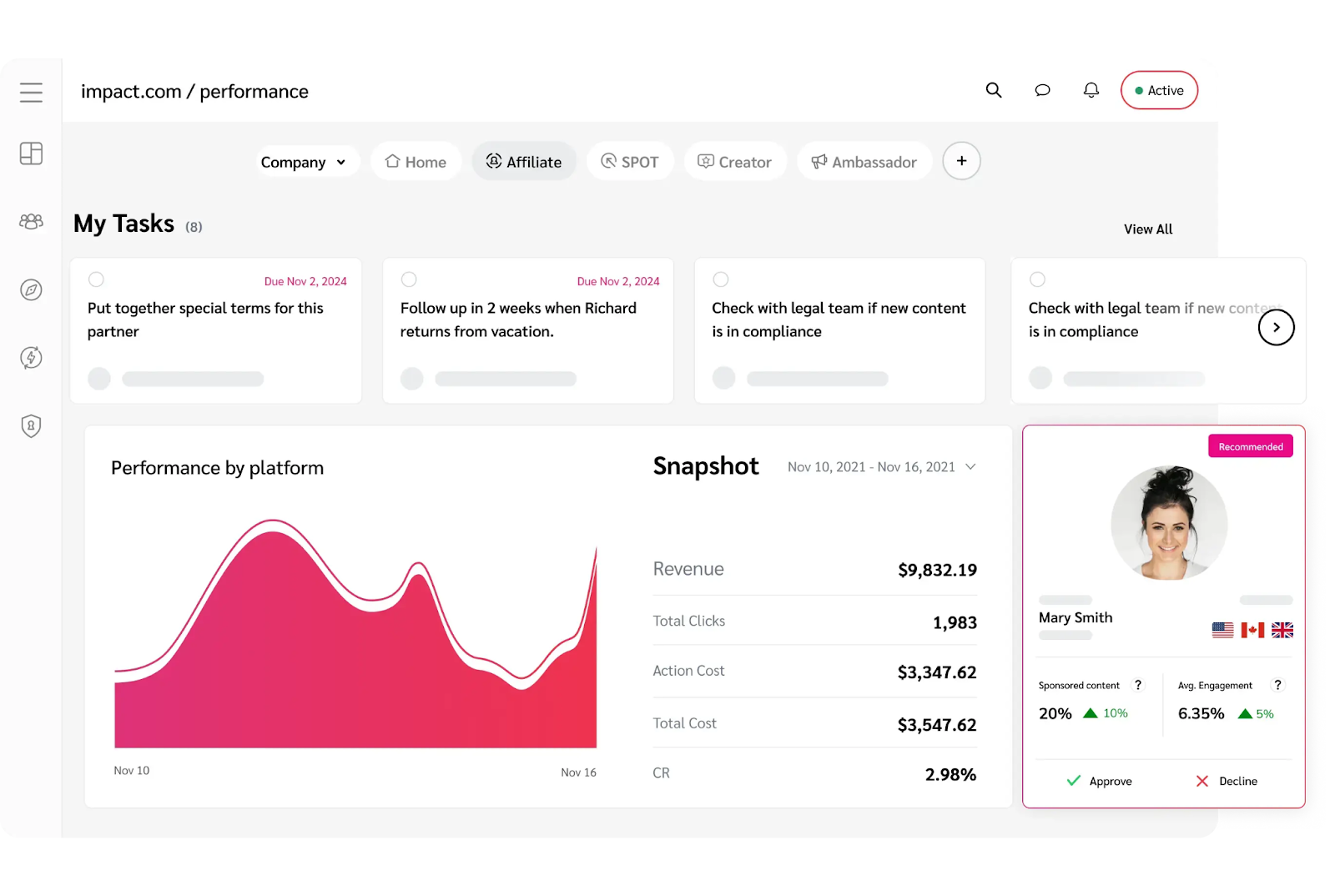
Impact.com has three paid plans:
- Starter starts at $30 per month or 2.5% of affiliate revenue (whichever is higher). It includes performance tracking, promo codes, and automated partner matching.
- Essentials costs $500 per month and adds access to 300K+ partners, custom reports, and multi-domain customer support.
- Professional, at $2,500 per month, includes custom signup flows, program-level billing, and a dedicated success manager.
- A 30-day free trial is also available.
Pros
- Access to 300K+ partners across influencer, publisher, and creator ecosystems.
- Supports custom contracts, commission structures, and partner dashboards.
- Scales well with enterprise growth.
- Automates payouts in 70+ currencies.
- Real-time tracking and performance dashboards.
- Strong Shopify compatibility and integrations (e.g., Recharge, Bold, Klaviyo).
Cons
- Expensive and not ideal for lean or early-stage DTC teams.
- Onboarding can be complex without internal resources.
- Requires more manual oversight for creators and campaigns.
- Most features are locked behind high-tier plans.
- Not built specifically for fast-moving Shopify brands.
Why choose impact.com: You get full control across affiliate, influencer, and publisher partnerships, which is very useful if you're running a high-volume program.
Why impact.com may not be right for your ecommerce brand
While impact.com is used by many DTC brands, it isn’t always the go-to option. Here’s why:
- It's built for complex, multi-region setups, not for lean Shopify teams that need speed.
- You’ll pay at least $30/month or 2.5% of affiliate revenue, even if you're just starting out.
- The UI is complex, and onboarding takes time, especially without a dedicated affiliate team.
- You don’t get native integrations with TikTok Shop or Instagram Shopping.
- Managing referrals, affiliates, and influencers still requires multiple tools.
For example, Cowboy Colostrum outgrew impact.com after struggling with manual payouts, confusing workflows, and a lack of visibility into affiliate performance. Once they moved to Social Snowball, they onboarded 1,725+ affiliates, hit $137K in affiliate revenue in just 30 days, and dropped their CPA to $10.79.
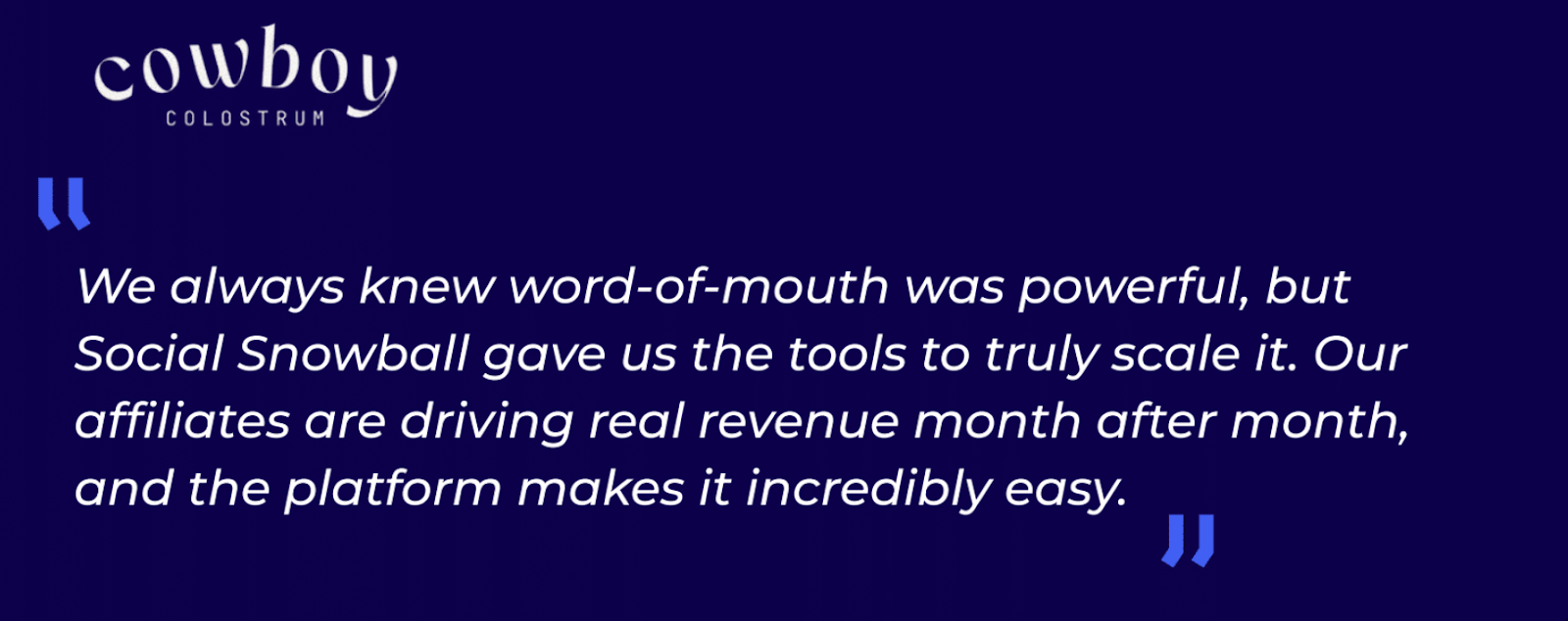
Alternatives to impact.com based on your brand goals
If impact.com isn’t the right fit for your ecommerce store’s affiliate marketing, there are many alternative tools that can better match your goals.
Here is a list of tools that give you actionable metrics, integrate seamlessly with your store, and help you manage affiliates, influencers, and referral programs without complexity:
Social Snowball: For brands that want to manage multiple programs and leverage automation
Ideal for: Shopify brands with lean teams that want to automate influencer, affiliate, and referral programs in one place, without sacrificing performance tracking or payout flexibility.
Social Snowball is a Shopify-native platform built to automate your word-of-mouth strategy (affiliate, influencer, and referral programs) without the manual effort. It turns every customer into an affiliate right after checkout, enables affiliate sign-up, tracks TikTok Shop and UGC performance, handles bulk payouts, and automates gifting, emails, and creator tiers from one clean dashboard. If you're scaling fast and want one tool that does it all, Social Snowball is built for you.
Pricing starts at $199 per month, including 3% of affiliate-attributed revenue. Flat-rate plans are also available at $599 per month with 0% commission.
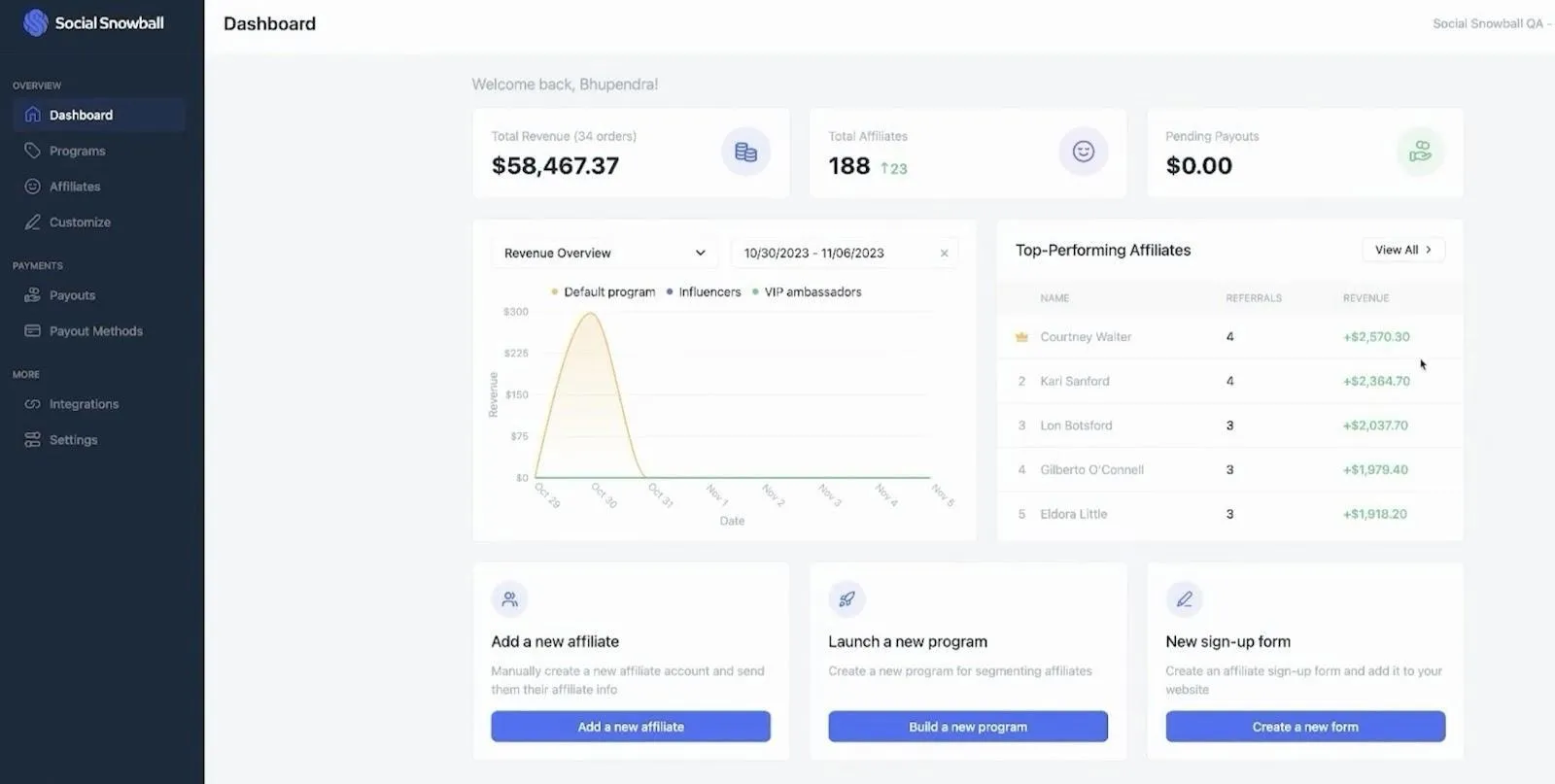
Features
- Post-purchase affiliate activation: Every customer becomes an affiliate after checkout without approvals or extra steps.
- Multi-program control: Run affiliate, referral, and influencer campaigns simultaneously with separate commissions and workflows.
- Fraud detection and prevention: Safelinks is a Social Snowball feature that detects fraud and prevents code leaks with single-use links that expire on use.
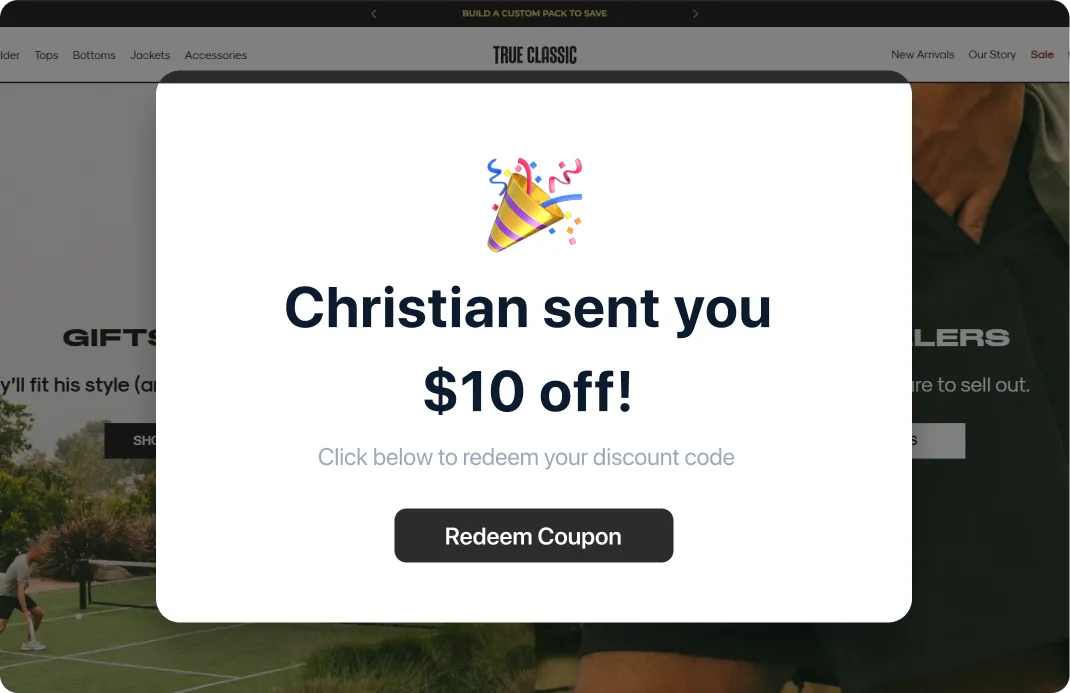
- TikTok Shop tracking: Attribute sales from TikTok content and store all UGC in a searchable media library.
- Automated gifting: Ship products to content creators or your affiliate partners in a few clicks.
- Tiered programs: Move high-performers into new commission tiers automatically.
- Bulk payouts: Send payments via Tremendous or Trolley in cash, gift cards, or donations.
- Marketing integrations: Trigger affiliate communications through Klaviyo, Postscript, or Sendlane.
- Native Shopify sync: Connect seamlessly with Shopify and sync orders, discounts, and affiliate network activity in real time.
Leading brands such as Triquetra Health have used Social Snowball to streamline their affiliate marketing program, generating more than $350K+ in sales.
Pros
- One tool to manage affiliates, referrals, and social media creators, simplifying workflows.
- Automate onboarding, code generation, content tracking, communication, and payouts.
- Clean UI with no learning curve, works for both your team and your partners.
- Built-in affiliate fraud protection and real-time visibility into performance.
Cons
- Not available for non-Shopify stores.
- The $199/month starting price might not fit your budget if you have low traffic.
- Not a fit if you run flat-fee influencer campaigns or brand ambassador deals.
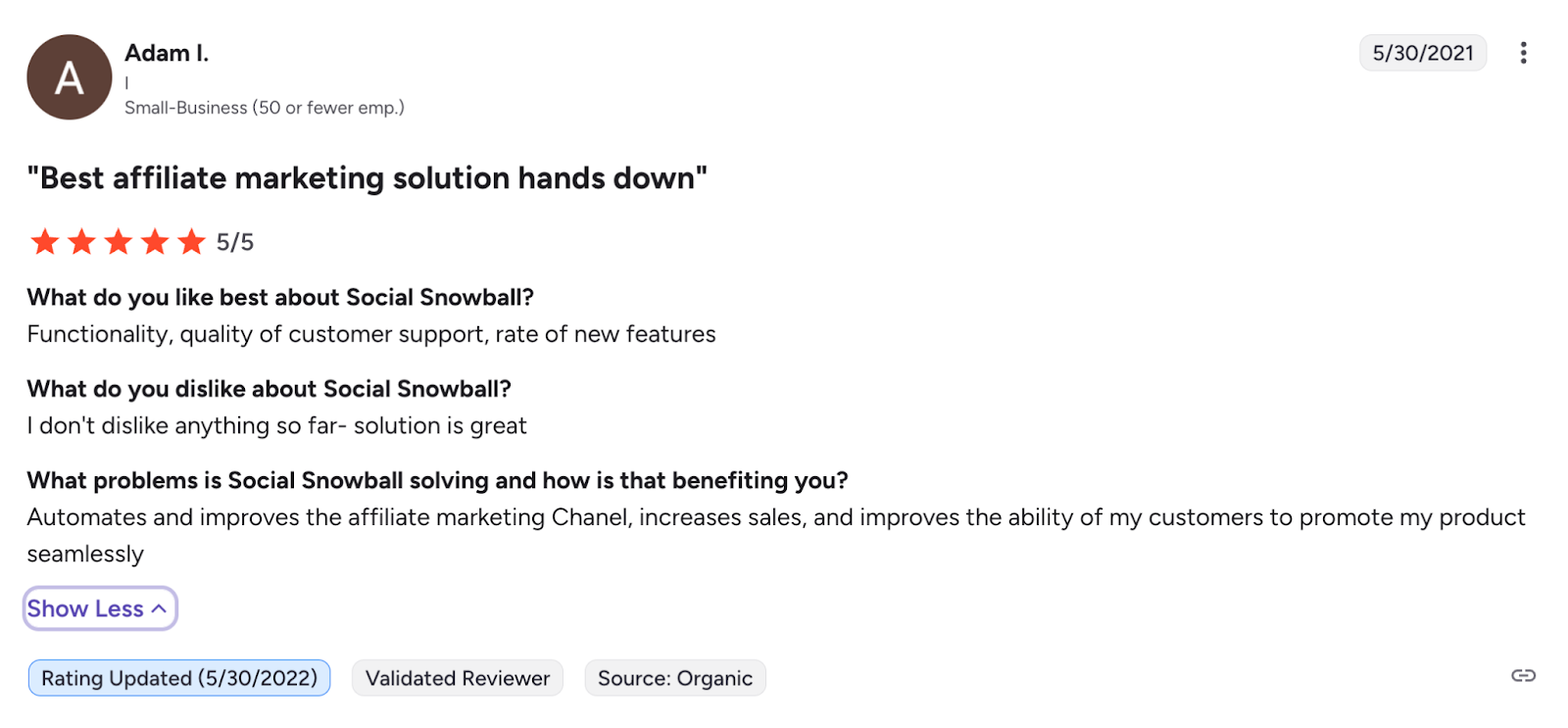
Refersion: For data-driven brands needing advanced reporting
Ideal for: Small to mid-sized brands that want platform flexibility, detailed tracking, and control over commissions, without needing automation or creator management tools.
Refersion is an affiliate partnership management platform for brands that want tight control over tracking, commissions, and reporting, but don’t mind doing some of the heavy lifting manually. It’s platform-agnostic, works across Shopify, WooCommerce, and BigCommerce, and is best for brands running traditional affiliate programs with content sites, email lists, or blogs.
Pricing for Refersion starts at $39 per month and 3% of affiliate-attributed revenue. Higher plans go up to $599 per month with lower rev-share and additional functionalities. The platform supports PayPal payouts and tax form collection.
Compare Refersion with Social Snowball to see how their features stack up.
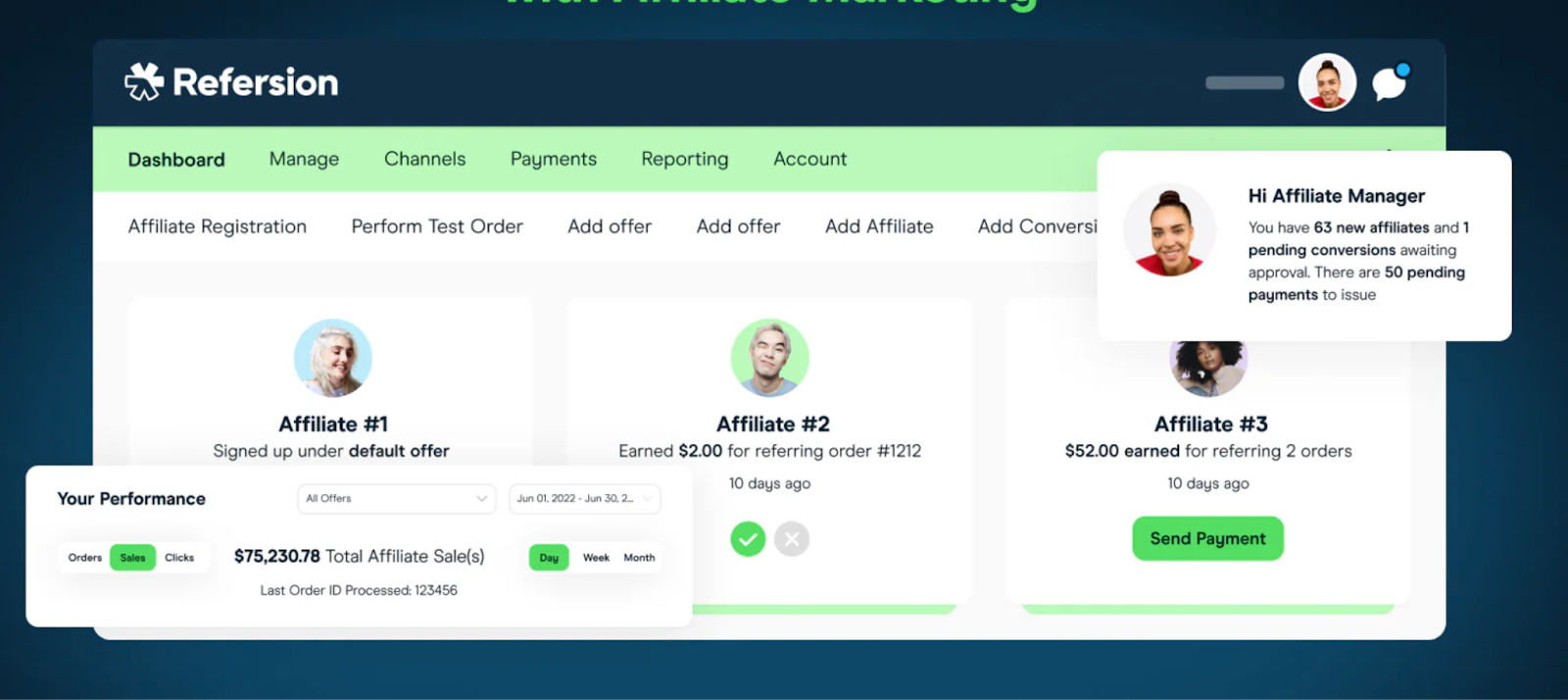
Features
- Post-purchase signup widget: Let customers join your affiliate partnership program at checkout.
- SKU & email-level tracking: Attribute sales to specific products or customer emails.
- Bulk & manual onboarding: Requires uploading affiliate lists; no auto-activation available.
- Affiliate portal: Give partners access to links, earnings, and profile management.
- First-party cookie tracking: More accurate attribution vs. third-party methods.
- One-click PayPal payouts: Quick payouts with limited flexibility.
- Multi-store support: Manage multiple storefronts under one account.
- 30+ integrations: Connect with Klaviyo, Recharge, Bold, Yotpo, and others.
Pros
- Platform agnostic and is not limited to Shopify.
- Flexible commission rules by product, customer, or channel.
- Supports tax form handling (US) out of the box.
- Connects with your existing martech stack via native integrations and APIs.
Cons
- No automation, so you’ll need to manage onboarding and payouts manually.
- The interface feels outdated and isn’t user-friendly. Setup can be complex without guidance.
- Reporting is rigid unless you use the API.
- Marketplace includes low-quality affiliates with minimal performance data.
- Users report that support can lag once you're past onboarding.
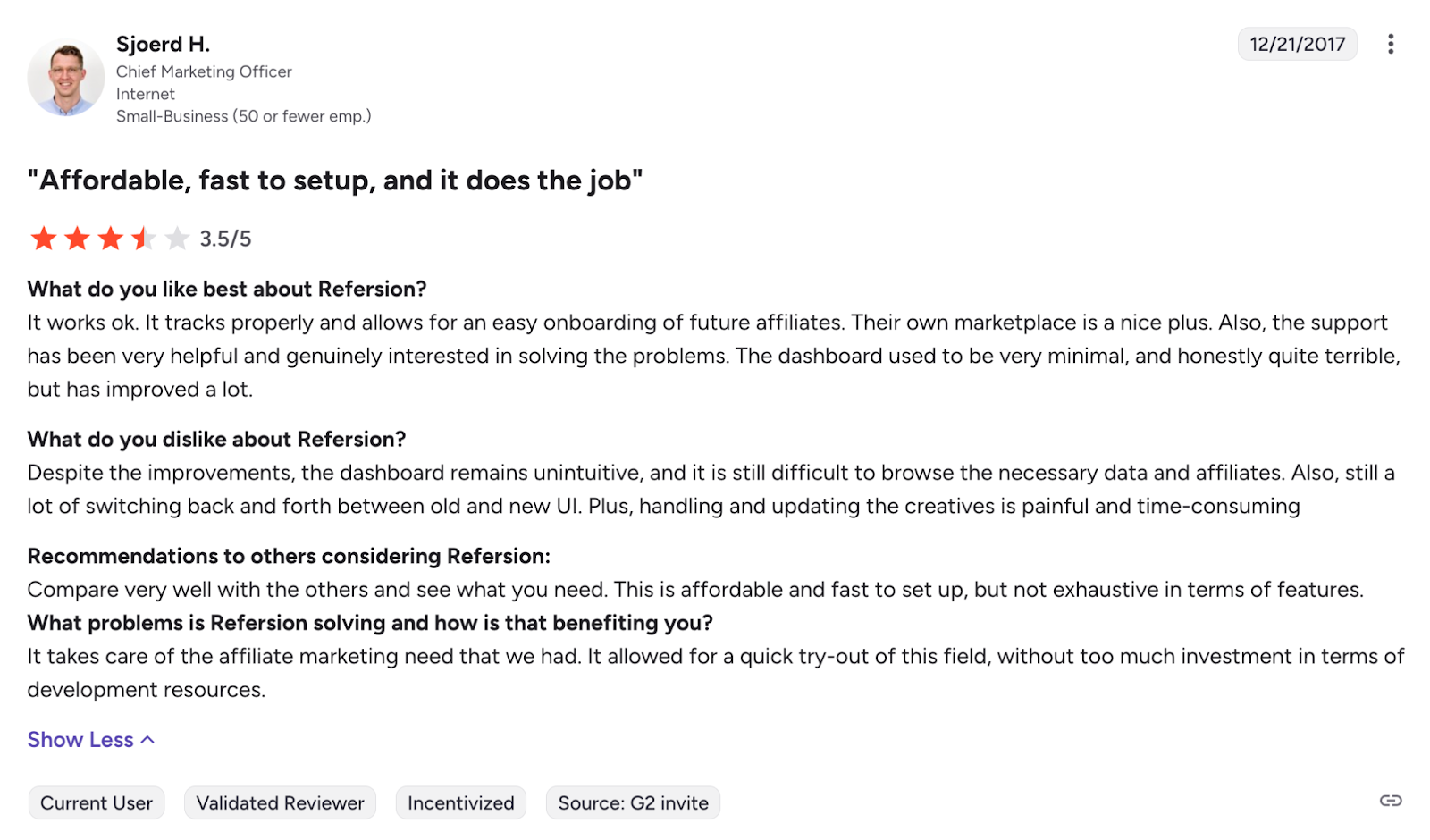
UpPromote: For brands prioritizing community and loyalty
Ideal for: Small to mid-sized Shopify brands focused on loyalty, word-of-mouth growth, and community-driven promotion, with basic tech needs.
UpPromote helps you run affiliate, referral, and influencer programs from a single dashboard with built-in tools for link creation, commission management, and recruiting new partners through its marketplace. The platform is beginner-friendly and lets you customize how your program looks across popups, widgets, and landing pages.
UpPromote has a free plan with limited features. Paid plans start at $29 per month.
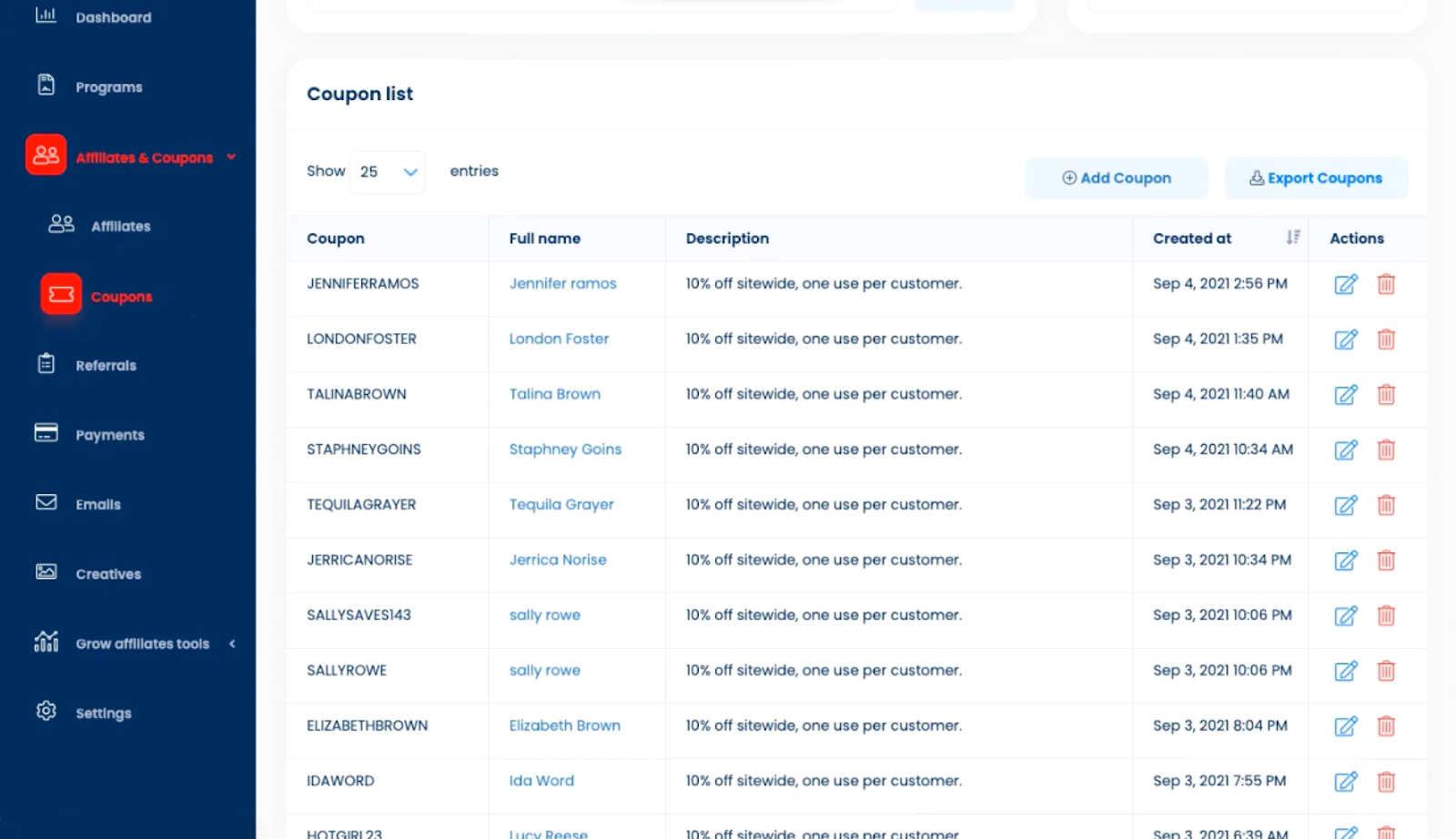
Features
- Built-in affiliate link generation: Create and assign affiliate links automatically.
- Referral and affiliate support: Run both programs in parallel with custom rewards.
- Custom program branding: Match widgets, popups, and landing pages to your brand style.
- Partner marketplace: Discover and recruit affiliates from a public directory.
- Store credit rewards: Let customers earn credits they can redeem on future orders.
- 24/7 support: Responsive help available at all plan levels.
- Real-time performance tracking: Monitor clicks, redemptions, and commissions live.
Pros
- Free to get started, which is great for new stores.
- Works inside Shopify admin, so no need to manage multiple logins.
- Combines referral and affiliate campaigns in one place.
- Rewards like store credit boost customer retention.
- Clean customization across customer-facing assets.
Cons
- No multi-store management. Each store needs its own plan.
- Onboarding and affiliate management involve repetitive manual tasks.
- Dashboard UX is clunky, and viewing full affiliate profiles takes extra clicks.
- Custom code creation isn’t streamlined, which slows down campaign setup.
- Occasional bugs and typos affect reliability.
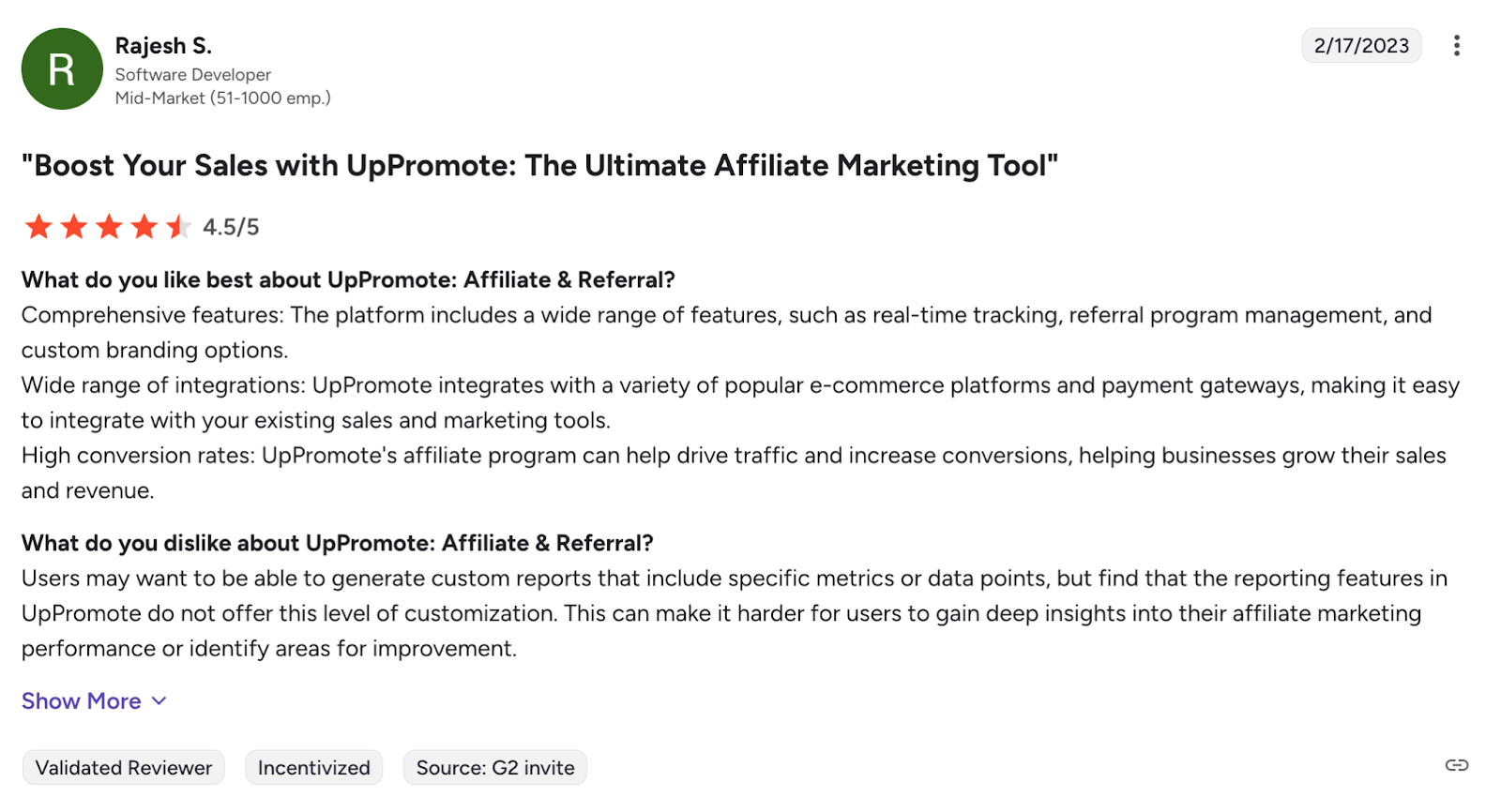
Grin: For brands that want full-service management
Ideal for: Mid-to-large brands or agencies with dedicated influencer teams, running multi-touch, long-term creator campaigns, and not just ecommerce.
Grin is a creator relationship management platform designed for large teams running complex influencer campaigns across multiple channels. It offers creator discovery, CRM, email workflows, product gifting, and campaign execution in one place. If your brand manages a high volume of influencers and needs deep control over every step (contracts, briefs, payouts, tracking), Grin gives you that infrastructure.
Pricing is not publicly listed. Third-party sources report that plans start at $999/month and scale up with usage. Additionally, there is no free trial or self-serve onboarding available.
Compare Grin with Social Snowball.
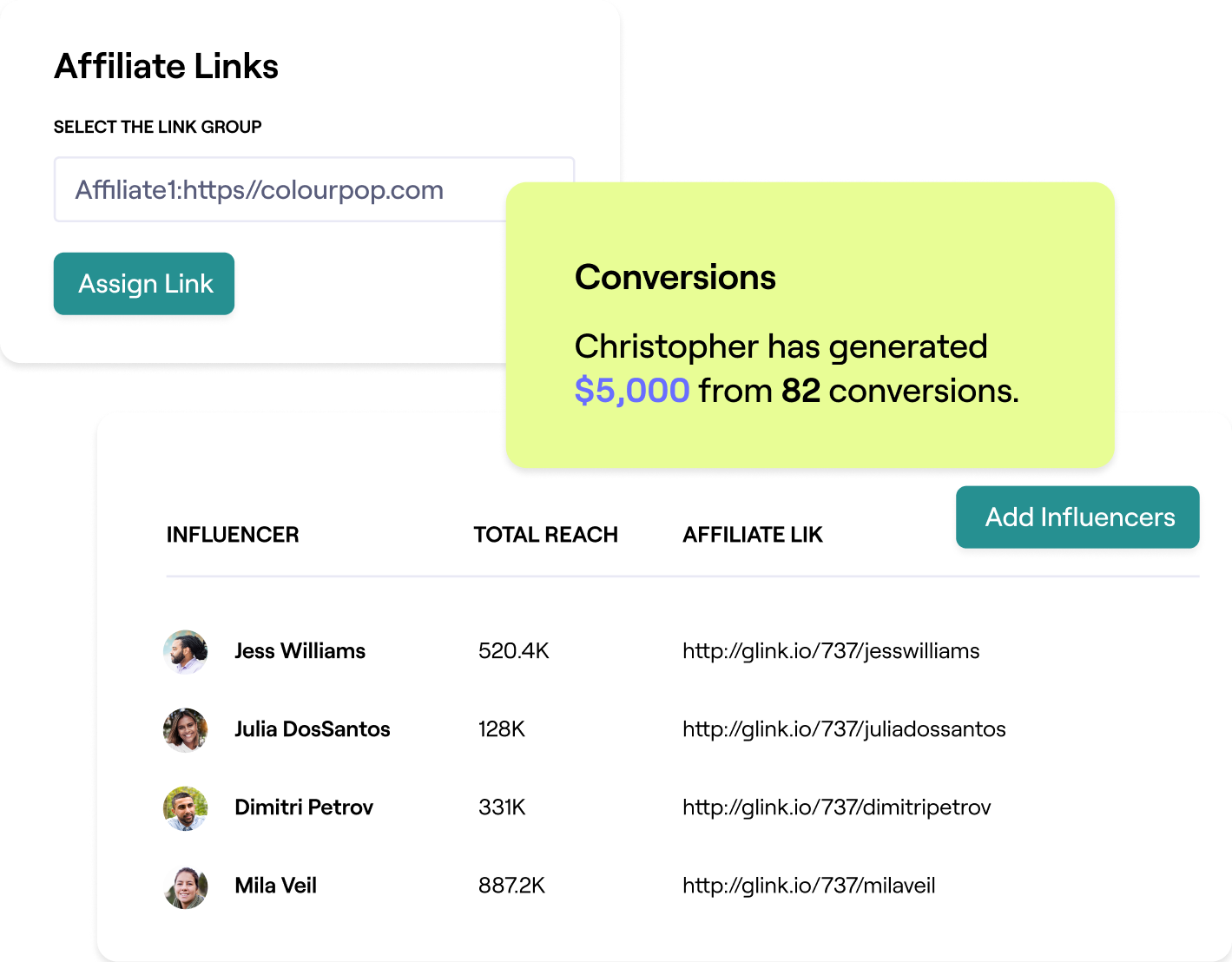
Features
- Influencer discovery: Search 300M+ creators by audience, platform, engagement, and more.
- Creator CRM: Tag, segment, and manage creators through custom status pipelines.
- Email marketing workflows: Automate outreach and follow-ups with in-platform sequences.
- Product gifting tools: Sync inventory and manage offers and shipments directly.
- Contracts and briefs: Handle e-signatures, documents, and creative briefs in one place.
- Campaign builder: Launch, track, and collaborate on campaigns with clear deliverables.
- Affiliate Hub: Track conversions, assign codes, and manage affiliate payouts.
- Performance reporting: Get detailed creator and campaign-level ROI breakdowns.
- Multi-channel integrations: Connect to Shopify, Klaviyo, Instagram, Gmail, TikTok, and other tools.
Pros
- Massive creator database makes recruiting fast and efficient.
- Full CRM for creators; manage relationships like you would sales leads.
- Supports affiliate, influencer, and gifting workflows from one system.
- Detailed reporting helps optimize by creator, campaign, or channel.
Cons
- Steep learning curve without a dedicated influencer team.
- Not built for ecommerce speed; limited Shopify-native features.
- Many tasks still require manual work or custom automation setups.
- High cost and no self-serve trial make it risky for lean teams.
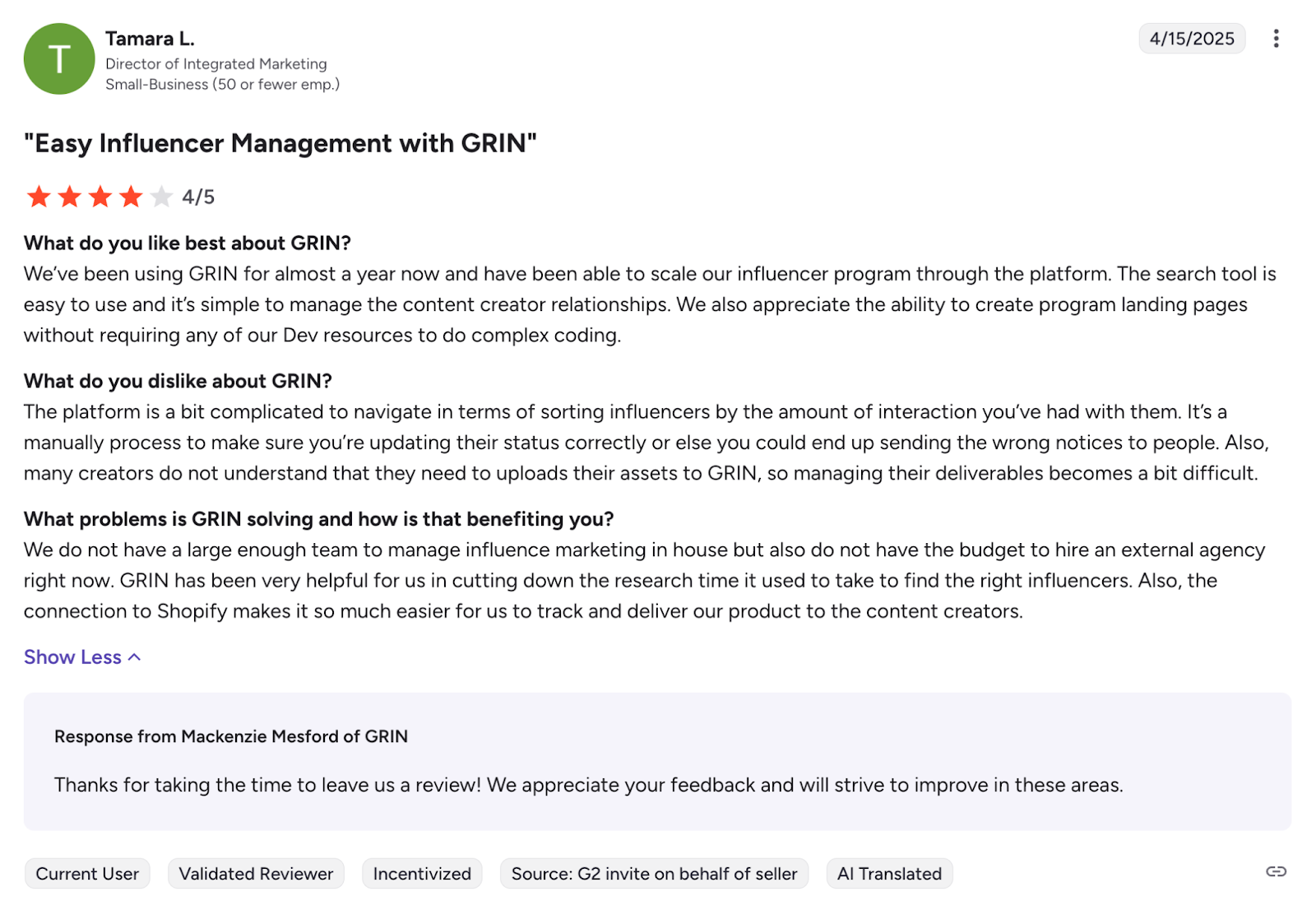
How to choose the right affiliate platform for your brand goals
The best affiliate marketing platform is the one that matches how your team works and what you’re trying to grow. Here’s how to decide what’s right for your brand:
- Ease of onboarding and use: If you can't get affiliates live within a day, you're already behind. Look for platforms that let you activate users post-checkout, avoid back-and-forth approvals, and require zero dev time to launch.
- Creator recruitment capabilities: You can’t grow with just your customer base. If influencer partnerships are a growth channel you want to prioritise, you need tools that help you discover creators, collect applications, and track content, not just manage links.
- Payout automation and analytics: If you’re calculating commissions manually or exporting CSVs every month, that’s a broken system. Your tool should auto-calculate payouts by tier, handle global currencies, and show clear ROI by affiliate.
- Integration with existing tech stack: If your platform doesn’t sync in real time with your existing platforms and tools like Shopify, Klaviyo, or Postscript, you’re missing key moments for upsells, attribution, and communication.
- Hybrid support for affiliates, influencers, referrals: If you’re managing each program using separate tools, you’re wasting time. The right platform lets you run multiple channels (affiliates, creators, and referrals) with shared data and workflows.
Set up a high-performing affiliate program for your ecommerce store
You don’t need an affiliate management tool packed with every feature available. You need one that lets you launch referral, affiliate, and influencer programs fast without chasing approvals, setting up manual workflows, or switching between platforms.
Social Snowball was built for lean ecommerce teams that want results without the overhead. You can turn customers into affiliates automatically, automate gifting, communication, and payouts, track TikTok Shop tracking, and manage multiple programs within one tool.


